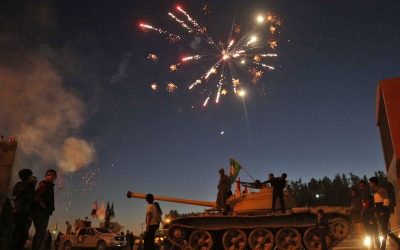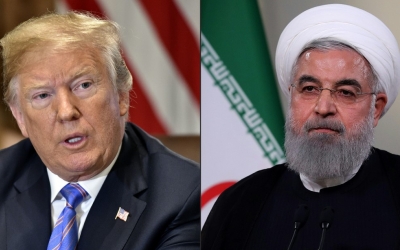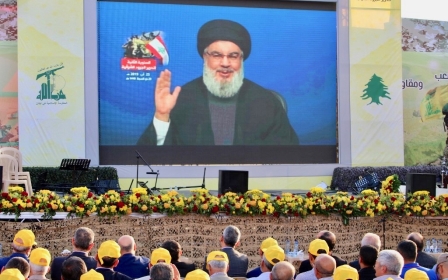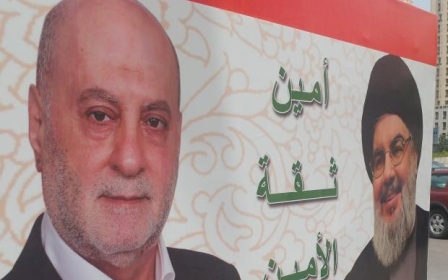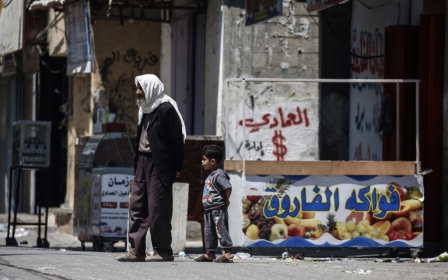'A declaration of war': Israeli military incursions into Lebanon stoke tensions

A series of apparent Israeli military incursions into Lebanon over the past two days have ratcheted up tensions between the neighbours, and prompted Lebanon's president to suggest Israel has made a "declaration of war".
Before dawn on Monday Israeli air strikes targeted a Palestinian faction in eastern Lebanon, Lebanese state media and the group said.
"Three hostile strikes" after midnight hit Lebanon's eastern mountains near Qusaya town, about 5km from the Syrian border, where the Popular Front for the Liberation of Palestine - General Command (PFLP-GC) has military posts, the National News Agency said.
The PFLP-GC said the raid was conducted by Israel, and it responded with anti-aircraft fire.
The strikes came just hours after Hassan Nasrallah, the head of Lebanese movement Hezbollah, threatened Israel after two drones fell in Beirut's southern suburbs, the group's stronghold, in what he described as a targeted "drone attack".
A day later, Lebanon's President Michel Aoun framed the drone incident as an attack on Lebanese sovereignty.
"What happened was similar to a declaration of war which allows us to resort to our right to defending our sovereignty," Aoun's office quoted him as saying on Twitter.
United Nations Spokesman Stephane Dujarric on Monday said the UN was unable to confirm the reports about the incident, but called on all sides to use "maximum restraint both in action and rhetoric", AFP news agency reported.
"It is imperative for all to avoid an escalation and abide by relevant Security Council resolutions," Dujarric continued.
PFLP-GC attack
The PFLP-GC has close ties to Hezbollah and the Syrian government. It has positions in the eastern region of Bekaa, as well as in al-Naameh just south of Beirut.
Khaled Jibril, an official in the Palestinian faction, told al-Mayadeen TV that the Qusaya base had been evacuated before the strike, which had only caused material damage.
"This aggression is a continuation of what happened in Beirut and a provocative attempt that is a direct reaction to Nasrallah's statements," he said.
Local Lebanese sources told Middle East Eye on Monday that Israeli jets have been hovering over Lebanon's south since the morning.
Brewing confrontation
On Sunday Nasrallah warned Israel that further incursions into Lebanese territory would be met with force.
"The time when Israeli aircraft come and bombard parts of Lebanon is over," he said.
"I say to the Israeli army along the border, from tonight be ready and wait for us," he added. "What happened yesterday will not pass."
Hezbollah is a major political actor in Lebanon and also a key government backer in war-torn Syria.
Anwar Raja, a PFLP-GC spokesman, backed Nasrallah's call to confront Israeli attacks.
'The time when Israeli aircraft come and bombard parts of Lebanon is over'
- Hassan Nasrallah
"We endorse the reactionary course that Nasrallah spoke about, as a single front," he said.
In July 2015, a security official said a blast at a PFLP-GC base in Qusaya wounded seven people, which the Palestinian group blamed on an Israeli strike.
Meanwhile, Iranian government spokesman Ali Rabiei said Monday that Nasrallah’s speech “was a clear and definitive message to Israel and their allies that its attacks will not go unanswered.”
Rabiei said Israel has to bear the consequences of its attacks in the region, including its recent air strikes against targets in Iraq.
Israel is accused of attacking a number of weapons depots belonging to the Iran-backed Popular Mobilisation Forces (PMF), an umbrella grouping of Iraq's mostly Shia paramilitary groups.
The strikes marked the first attacks by Israel on Iraqi soil since 1981, when Israeli jets struck an under-construction nuclear reactor being built by then president Saddam Hussein.
On Sunday, two PMF militiamen were killed and another was wounded in drone attacks that the militia group blamed on Israel.
The PMF said two unmanned aircraft had carried out the attack near the Iraqi border with Syria and accused the United States of providing air support to Israel for the strikes.
A security source told Reuters there were two air strikes, one of which struck the headquarters of a local paramilitary brigade in al-Qaim, a city in the Anbar province, while the other struck a convoy of cars leaving the building.
Some Iraqi reports said six PMF members were killed.
The drone incident in Lebanon came a day after Israel launched strikes in Syria on what its army said were military facilities belonging to Iran’s elite Revolutionary Guard in the town of Aqraba, southeast of Damascus.
"We've been tracking the Quds force" for weeks, said Israel’s military spokesman Jonathan Conricus.
Nasrallah said those strikes killed two Hezbollah youth members, and that the site hit was a recreational area, not a military facility. A high-ranking official in Tehran also denied any Iranian positions had been hit.
Nasrallah also vowed retaliation for the Syria strike, warning Israeli soldiers “to wait for us standing on one foot and a half, from tonight."
The Israeli military claimed that Saturday’s strikes were to prevent an Iranian attack on Israel.
The Syrian Observatory for Human Rights, a Britain-based activist group, said five fighters were killed.
While Israel has never directly taken part in Syria’s war, it has however conducted hundreds of strikes in the country, most of which it says were against Iranian and Hezbollah targets.
Hezbollah and Israel last fought a war in 2006, in a devastating month-long conflict that killed over 1,000 Lebanese civilians and scores of fighters on both sides.
Middle East Eye propose une couverture et une analyse indépendantes et incomparables du Moyen-Orient, de l’Afrique du Nord et d’autres régions du monde. Pour en savoir plus sur la reprise de ce contenu et les frais qui s’appliquent, veuillez remplir ce formulaire [en anglais]. Pour en savoir plus sur MEE, cliquez ici [en anglais].


